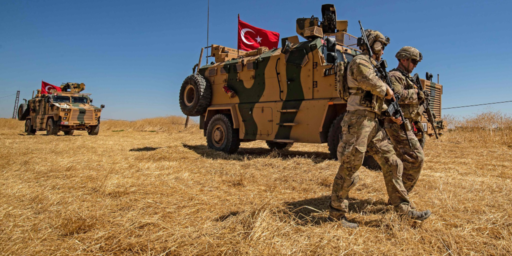ENGAGING SYRIA
Flynt Leverett writes,
Israel’s air strike against the Ain Sahab camp near Damascus last Sunday dramatically underscores the failure of the Bush administration to deal effectively with Syria. At the beginning of May, after President George W. Bush had announced the end of Operation Iraqi Freedom, Colin Powell, US secretary of state, travelled to Damascus to reiterate American complaints about Syria’s links to terrorist groups and its at least passive aggression against US forces in Iraq. Although Mr Powell claimed progress after his meeting with Bashar al-Assad, Syria’s president, it soon became evident that the Syrians had little intention of changing course. It was continued Syrian support for Palestinian terror groups that gave Ariel Sharon, Israel’s prime minister, the opening he needed to order Sunday’s strike in response to a suicide bombing by Islamic Jihad.
***
As Mr Assad observed last week, the US military will not soon be in a position to conduct “Operation Syrian Freedom”. And the Bush administration has not developed a credible package of “sticks”, short of invasion. Even Israel’s strike did not really impose costs on Mr Assad’s regime; if anything, it bolstered his ability to boast that he is the only Arab head of state “resisting Israeli aggression”. Meanwhile, Pentagon civilians and their allies have blocked any offer of “carrots”, arguing this would reward bad behaviour. The result is a non-policy.
To be effective, Washington must contrast the prospective costs of non-cooperation, such as economic sanctions, with the prospective gains from co-operation. These could include Syria’s removal from the list of state sponsors of terrorism, provided it expels terrorists from its territory, renews its anti-terrorist co-operation with the US against al-Qaeda and broadens that to include Syria’s own terrorist links. Another “carrot” could be accommodation of Syrian interests in Iraq, if Damascus helped tackle the security problems there. All this would let Mr Assad show the regime’s inner circle and the public that Syrian interests would be better served by co-operation with the US.
Strategic engagement succeeded in getting Sudan out of the terrorism business and close to a negotiated settlement of its civil war; this approach has also succeeded in persuading Libya to meet its obligations in the Pan-Am 103 case. It could also be the key to a more productive US relationship with Syria, at a time when both parties could use better ties.
While I don’t disagree that a combination of carrots and sticks is virtually always a good policy, the Sudan and Libya examples are rather odd choices given that, in both cases, it took many years to achieve our policy objectives. A U.S. invasion of Syria is certainly not called for at this juncture and even implied threats of such an operation would ring hollow. However, Israel appears more than willing to serve as the stick. In that regard, the Bush Administration should back Israel’s play and demand Syrian compliance with the norms of international law.





